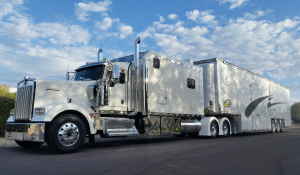Introduction: Understanding Enclosed Auto Transport For Non-Running Vehicles
Transporting a non-running vehicle can be a daunting task, especially when you want to ensure its safety and protection throughout the journey. While there are various methods available to ship vehicles, enclosed auto transport is often the preferred choice for those looking to transport non-running vehicles securely. In this subtopic, we will explore the concept of enclosed auto transport and how it caters specifically to the needs of non-running vehicles.
Enclosed auto transport refers to a specialized method of shipping vehicles in an enclosed trailer rather than an open carrier. This type of transportation offers an added layer of protection against external elements such as adverse weather conditions, road debris, or potential damage from other vehicles during transit. When it comes to non-running vehicles, which may require additional care and attention during transportation, enclosed auto transport ensures that they receive the utmost protection from any potential harm.
One key advantage of choosing enclosed auto transport for non-running vehicles is the ability to load and unload them with specialized equipment such as winches or hydraulic lifts. These tools enable efficient and safe handling without causing further damage to the vehicle. Additionally, since non-running vehicles cannot be driven onto a trailer like their operational counterparts, an enclosed trailer provides easy access through rear ramps or liftgates.
Whether you own a vintage car that requires restoration or have recently purchased a project vehicle in need of repair, transporting your non-running vehicle via enclosed auto transport ensures that it arrives at its destination in pristine condition. By opting for this method, you can have peace of mind knowing that your valuable asset is well-protected throughout its journey.
The Benefits Of Using Enclosed Auto Transport For Shipping Non-Running Vehicles
When it comes to shipping a non-running vehicle, using enclosed auto transport can offer numerous benefits that ensure the safety and security of your valuable asset. Firstly, enclosed auto transport provides superior protection against external elements. Non-running vehicles are more susceptible to damage from weather conditions such as rain, hail, snow, or extreme temperatures. By opting for enclosed transport, you can shield your non-running vehicle from these potential hazards.
The fully covered trailer will protect your vehicle from the elements throughout its journey, giving you peace of mind that it will arrive in the same condition as when it was loaded. Secondly, enclosed auto transport offers enhanced security for non-running vehicles. These types of vehicles are often more vulnerable to theft or vandalism due to their immobility. With an enclosed trailer, your non-running vehicle will be concealed from prying eyes and potential thieves.
The added security measures provided by professional carriers ensure that your vehicle remains safe during transit. Additionally, enclosed auto transport eliminates the risk of damage from road debris or flying objects. When transporting a non-running vehicle on an open carrier, there is always a chance that loose stones or other debris could cause scratches or dents during transit. Enclosed trailers eliminate this risk entirely by providing a sealed and protected environment for your non-running vehicle.
Lastly, using enclosed auto transport for shipping a non-running vehicle offers privacy and confidentiality. If you have concerns about keeping the details of your valuable asset private during transportation, an enclosed trailer provides the necessary discretion. In conclusion, utilizing enclosed auto transport for shipping non-running vehicles ensures superior protection against external elements and potential damage caused by theft or vandalism.
Assessing The Condition Of Your Non-Running Vehicle: What To Consider
When it comes to shipping a non-running vehicle using an enclosed auto transport, there are several factors to consider in order to ensure a smooth and successful transportation process. Before making any arrangements, it is crucial to assess the condition of your non-running vehicle thoroughly. This assessment will help you determine whether it is suitable for enclosed auto transport and what additional precautions may be required.
Firstly, you should evaluate the overall condition of the vehicle’s body and structure. Look for any signs of damage such as dents, rust, or loose parts. It is important to address these issues prior to shipping as they can potentially worsen during transportation.
Next, check the tires and suspension system. If your non-running vehicle has flat tires or a compromised suspension, it may require special equipment or handling during loading and unloading procedures. Communicating these details with your auto transport provider is essential in order for them to make necessary arrangements.
Additionally, inspect the interior of your non-running vehicle. Remove any personal belongings or loose items that could shift during transportation and cause further damage.
Furthermore, examine the brakes and steering system. While these components may not directly affect shipping arrangements, ensuring they are in good working condition can provide peace of mind regarding overall safety.
Lastly, consider any specific mechanical issues that caused your vehicle to become non-operational. Communicate these details with your auto transport provider so they can prepare accordingly.
By carefully assessing the condition of your non-running vehicle before arranging its shipment via enclosed auto transport, you can ensure proper preparations are made for its safe transportation while minimizing potential risks or damages along the way.
Choosing The Right Enclosed Auto Transport Company For Shipping Non-Running Vehicles
When it comes to shipping non-running vehicles, finding the right enclosed auto transport company is crucial. Entrusting your valuable and immobile vehicle to a reliable and experienced transporter ensures a smooth and secure transportation process. Here are some factors to consider when choosing the right enclosed auto transport company for shipping non-running vehicles. Firstly, it is vital to ensure that the company has expertise in handling non-running vehicles.
Not all transporters are equipped to handle such shipments, as they require specialized equipment and knowledge. Look for companies that explicitly mention their experience in transporting non-running vehicles or have positive reviews from customers who had similar requirements. Another important factor is insurance coverage. Non-running vehicles may be more susceptible to potential damage during transportation due to their immobility. Ensure that the transport company provides comprehensive insurance coverage specifically tailored for shipping non-running vehicles.
This will protect you financially in case of any unfortunate incidents during transit. The reputation of the transport company also plays a significant role in your decision-making process. Research customer reviews and ratings online to gauge the overall satisfaction level of previous clients regarding their services, particularly for shipping non-running vehicles. Positive testimonials indicate reliability and professionalism, while negative feedback should raise red flags.
Furthermore, consider the availability of tracking systems offered by the transport company. Being able to track your vehicle’s progress throughout its journey provides peace of mind and allows you to stay informed about its status. Lastly, obtain multiple quotes from different enclosed auto transport companies before making a decision. While cost should not be the sole determining factor, comparing prices will help you find a reputable transporter offering competitive rates for shipping your non-running vehicle safely.
Preparing Your Non-Running Vehicle For Enclosed Auto Transport: Essential Steps
When it comes to shipping a non-running vehicle using enclosed auto transport, proper preparation is crucial to ensure a smooth and hassle-free experience. By taking the following essential steps, you can help safeguard your vehicle and make the transportation process more efficient:
1. Clear out personal belongings: Before transporting your non-running vehicle, it is important to remove any personal items from inside. This will prevent them from shifting during transit and causing damage to your car or other vehicles being transported. 2. Document existing damages: Thoroughly inspect your non-running vehicle and document any existing damages such as dents, scratches, or mechanical issues. Taking clear photographs can serve as evidence in case of any disputes regarding the condition of your vehicle upon delivery.
3. Secure loose parts: Ensure that all loose parts on the exterior or interior of your non-running vehicle are properly secured or removed altogether. This includes detachable mirrors, antennas, spoilers, or loose body panels that could potentially become detached during transit. 4. Disable alarm systems: If your non-running vehicle has an alarm system installed, make sure it is disabled before handing over the keys for transportation.
This will prevent unnecessary activation during loading and unloading processes. 5. Check tire pressure: While a non-running vehicle won’t be driven onto the carrier trailer, maintaining proper tire pressure is still important for safe loading and unloading operations. 6. Drain fluids if necessary: If instructed by the transport company, drain any fluids such as gasoline or engine oil from your non-running vehicle prior to transport to prevent leaks or spills that could damage other vehicles on the carrier trailer.
Ensuring Safe Loading And Unloading Of A Non-Running Vehicle During Transport
Transporting a non-running vehicle can be a challenging task, requiring careful attention to ensure safe loading and unloading. Whether you are shipping a classic car that needs restoration or simply moving a vehicle that cannot be driven, utilizing enclosed auto transport offers the best protection for your non-running vehicle.
Prior to loading the vehicle onto an enclosed trailer, thorough preparation is essential. Start by inspecting the condition of the vehicle’s exterior and interior. Take note of any existing damage and document it with photographs. This will help in case any additional damage occurs during transport.
Next, remove all personal belongings from the vehicle to prevent them from shifting or getting damaged during transit. Secure loose parts inside the car, such as mirrors or antennas, to minimize potential damage caused by movement.
To facilitate loading and unloading procedures, ensure there is sufficient space for maneuvering both at the pickup and delivery locations. It is crucial to communicate with your auto transport company regarding any obstacles that might hinder access to these areas.
During loading, professionals will use specialized equipment such as winches or hydraulic lifts to carefully position your non-running vehicle onto the trailer. They will secure it with straps or wheel nets specifically designed for immobilizing vehicles during transportation.
Upon arrival at the destination, trained professionals will unload your non-running vehicle using similar specialized equipment. They will take precautionary measures to avoid any mishaps during this process.
By entrusting your non-running vehicle’s transportation to experienced professionals who utilize enclosed auto transport services, you can have peace of mind knowing that every effort will be made to ensure its safe loading and unloading procedures are followed meticulously.
Understanding Insurance Coverage For Shipping A Non-Running Vehicle Via Enclosed Auto Transport
When it comes to shipping a non-running vehicle using enclosed auto transport, understanding the insurance coverage provided is crucial. Shipping companies typically offer insurance coverage to protect your vehicle during transit, but it is essential to comprehend the terms and limitations of this coverage.
Most reputable auto transport companies provide insurance that covers any damage caused during transportation. However, it is important to note that some policies may have exclusions for non-running vehicles or specific conditions related to their transportation.
Before shipping a non-running vehicle, it is advisable to thoroughly review the insurance policy offered by your chosen transport company. Look for any clauses or terms that specifically mention coverage for non-running vehicles. This will help you understand whether there are any limitations or additional requirements associated with transporting such vehicles.
In some cases, additional fees or conditions may apply when shipping a non-running vehicle due to the increased risks involved. The insurance coverage provided might be contingent upon meeting these requirements. For instance, the company may insist on appropriate loading equipment or securing mechanisms to minimize potential damage during transit.
Moreover, it is crucial to document the condition of your non-running vehicle before handing it over for transportation. Take detailed photographs from different angles and note any existing damages or issues. This documentation can serve as valuable evidence in case you need to file an insurance claim later on.
While shipping a non-running vehicle via enclosed auto transport can be convenient and secure, understanding the insurance coverage provided is vital for protecting your investment. By carefully reviewing the policy and adhering to any special requirements outlined by the transport company, you can ensure that your non-running vehicle is covered adequately throughout its journey.
Cost Considerations: Is Shipping A Non-Running Vehicle With Enclosed Auto Transport Worth It?
Cost Considerations: Is Shipping a Non-Running Vehicle with Enclosed Auto Transport Worth It? When it comes to shipping a non-running vehicle, there are several factors to consider, particularly in terms of cost. One option to transport such vehicles is through enclosed auto transport, which offers a higher level of protection and security compared to open carriers. However, the added benefits come at an additional expense.
The primary cost consideration when shipping a non-running vehicle with enclosed auto transport is the higher price tag associated with this service. Enclosed carriers provide protection from external elements such as weather conditions, debris, and potential damage during transit. This level of security ensures that your non-running vehicle remains safe throughout the journey. However, the added protection comes at a premium cost due to the limited space available on enclosed carriers and the need for specialized equipment.
Another factor that influences costs is the condition of your non-running vehicle. If your vehicle is inoperable due to minor issues like a dead battery or flat tires, additional charges may apply for loading and unloading procedures. However, if more extensive repairs or modifications are required for transportation purposes, such as fixing mechanical issues or making modifications for safe loading onto the carrier, these costs can significantly increase.
Additionally, distance plays a crucial role in determining overall expenses. Longer distances generally result in higher shipping costs due to fuel consumption and driver compensation. Ultimately, whether shipping a non-running vehicle with enclosed auto transport is worth it depends on individual circumstances and priorities. If your vehicle holds significant sentimental or financial value or requires extra protection due to its condition or rarity, paying extra for an enclosed carrier might be worthwhile.
Conclusion: Making An Informed Decision About Shipping Your Non-Running Vehicle With Enclosed Auto Transport
When it comes to shipping a non-running vehicle, opting for enclosed auto transport can provide a range of benefits and ensure the safety of your precious possession. This method offers protection from external elements, such as harsh weather conditions and road debris, which is particularly crucial for vehicles that are unable to be driven. Additionally, enclosed auto transport provides enhanced security measures that reduce the risk of theft or vandalism during transit.
However, before making a decision about shipping your non-running vehicle with enclosed auto transport, it is essential to consider certain factors. Firstly, evaluate the condition and value of your vehicle. If it holds significant sentimental or monetary value, investing in enclosed auto transport is undoubtedly a wise choice.
Secondly, take into account your budget and compare the costs associated with different shipping options. While enclosed transport may be more expensive than open-air carriers due to its added benefits, it guarantees greater peace of mind knowing that your non-running vehicle will be protected throughout its journey.
Lastly, carefully research and choose a reputable auto transport company that specializes in handling non-running vehicles. Look for customer reviews and ratings to ensure their reliability and professionalism.
By considering these factors and making an informed decision regarding shipping your non-running vehicle with enclosed auto transport, you can rest assured knowing that your valuable possession will be transported safely and securely. Whether you are relocating or selling the vehicle remotely, this method ensures maximum protection during transit while maintaining the integrity of your non-functioning automobile.













